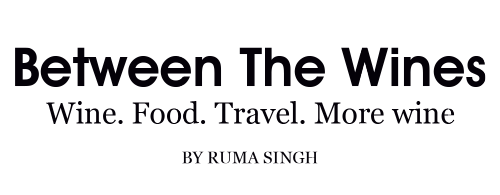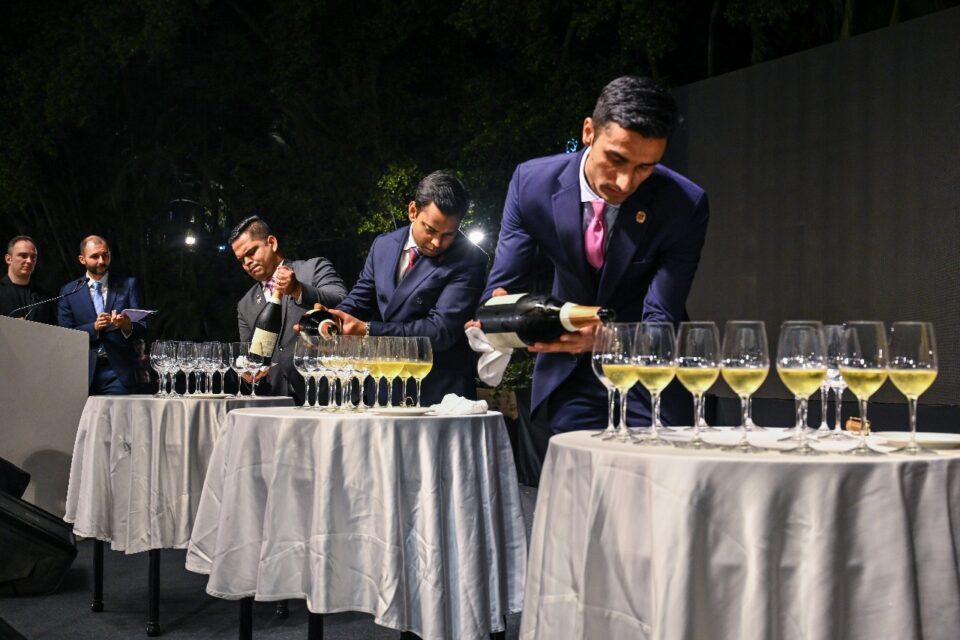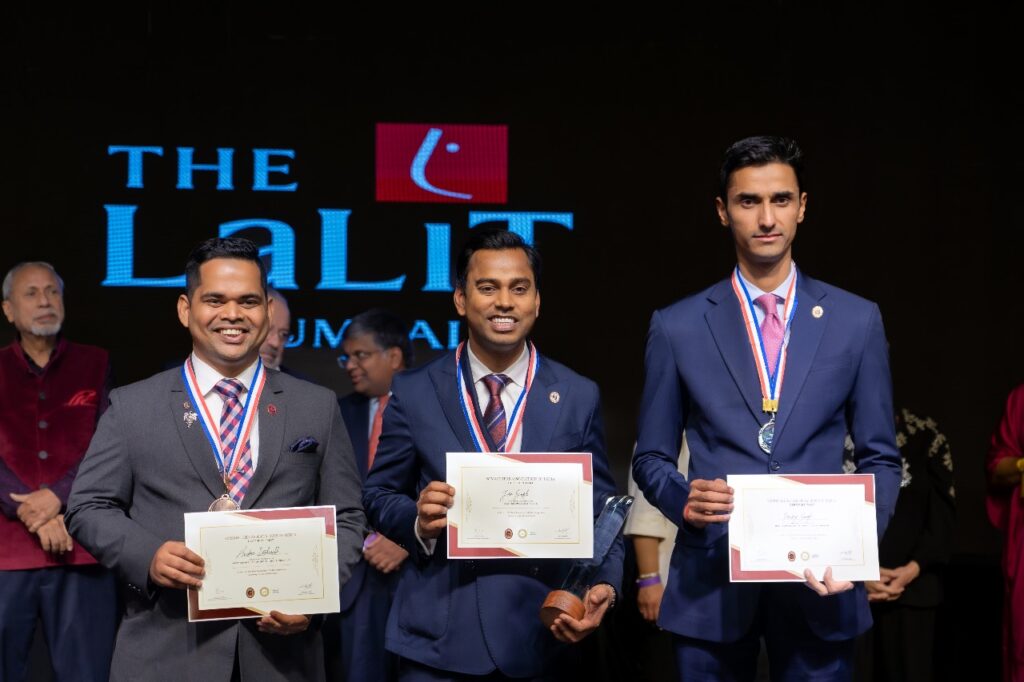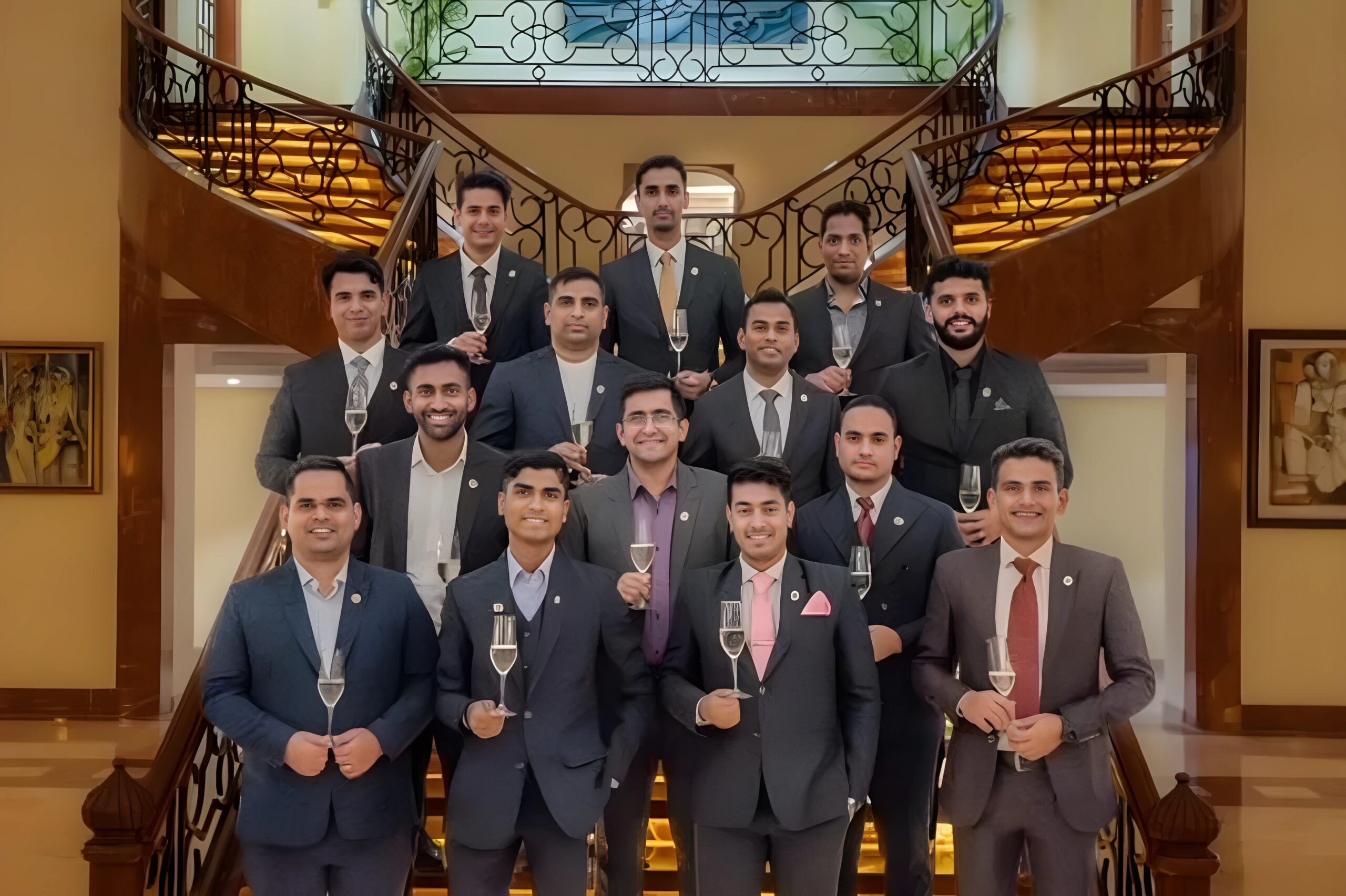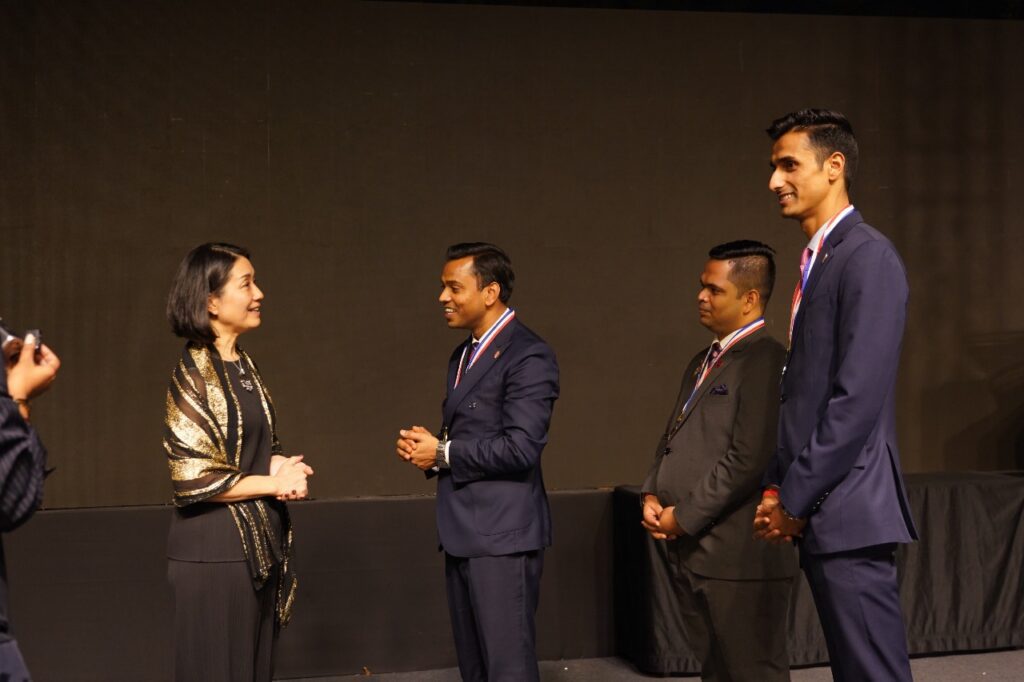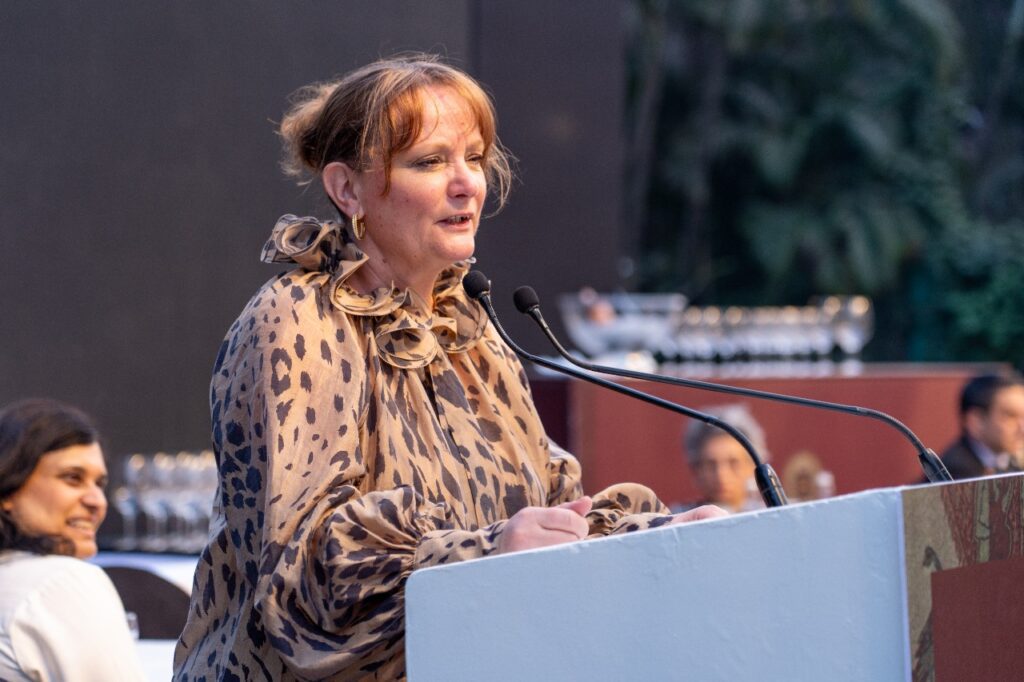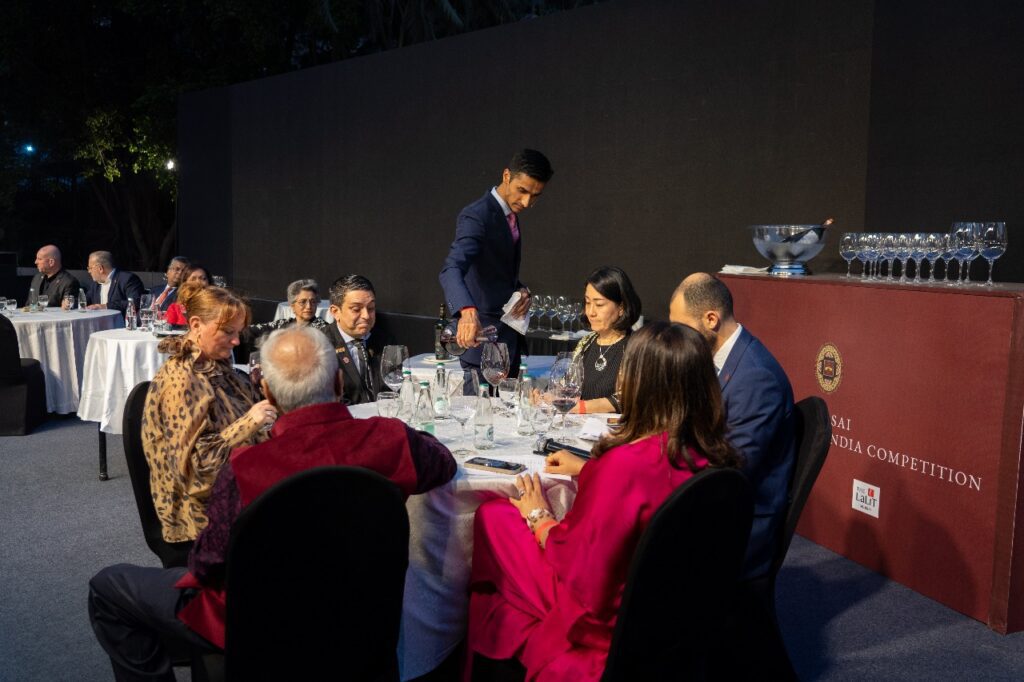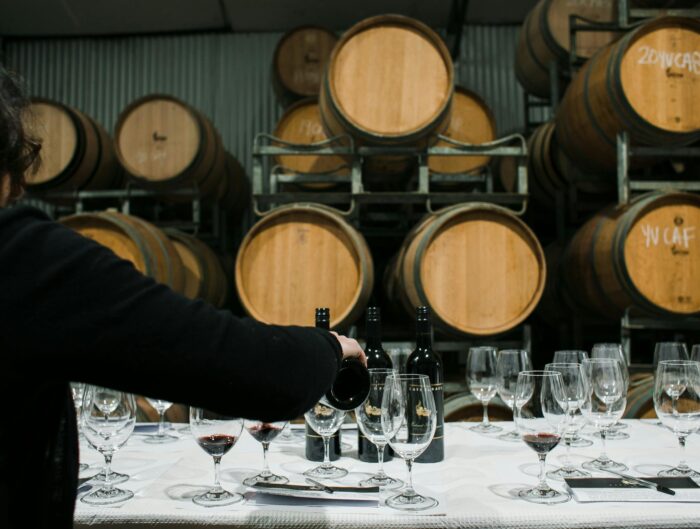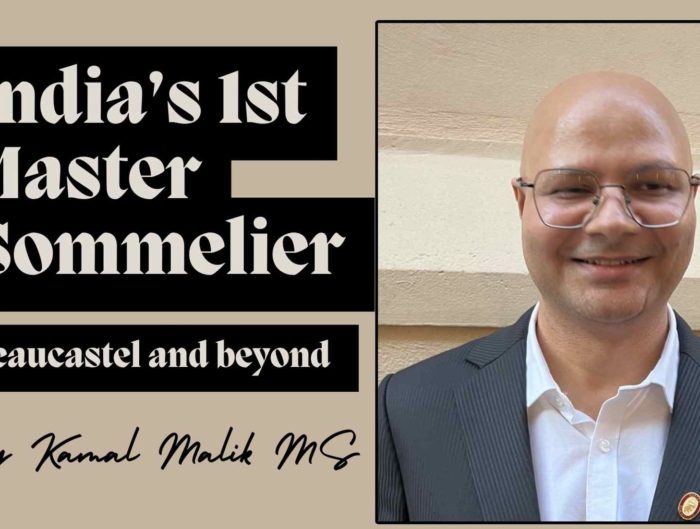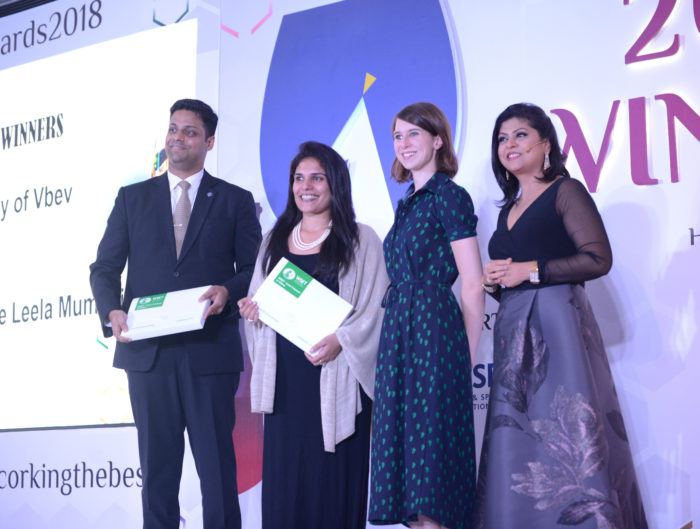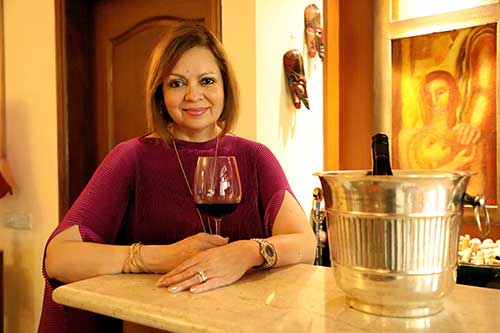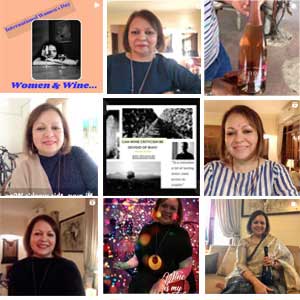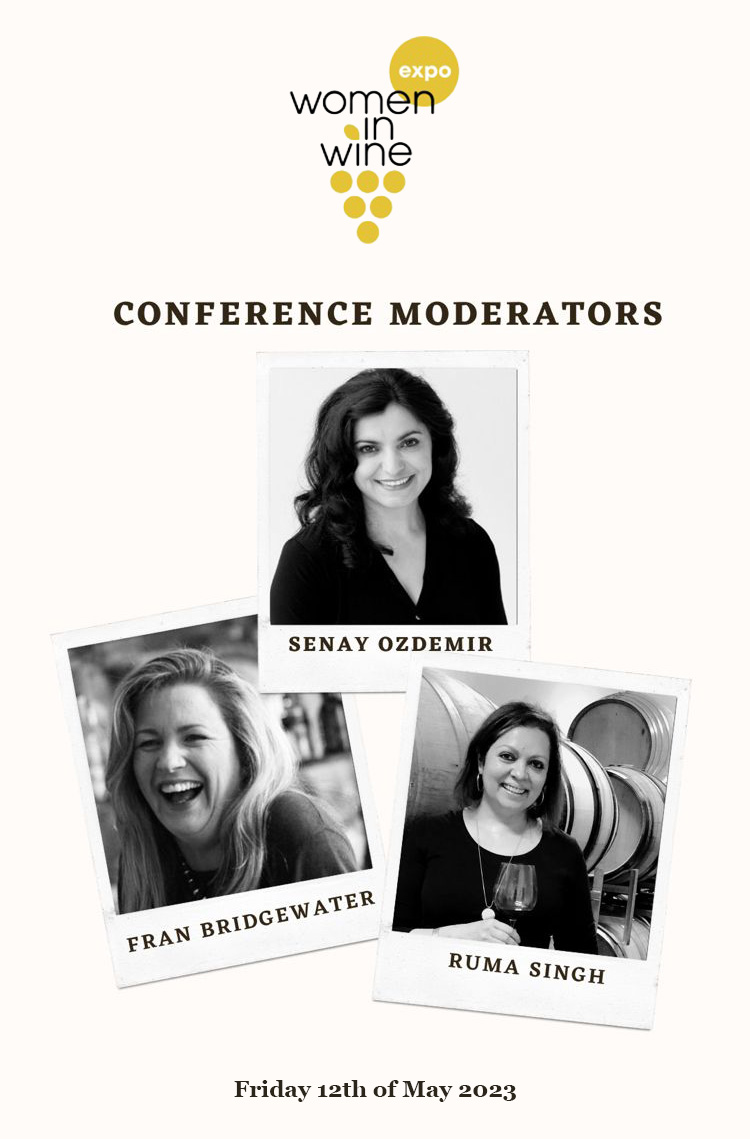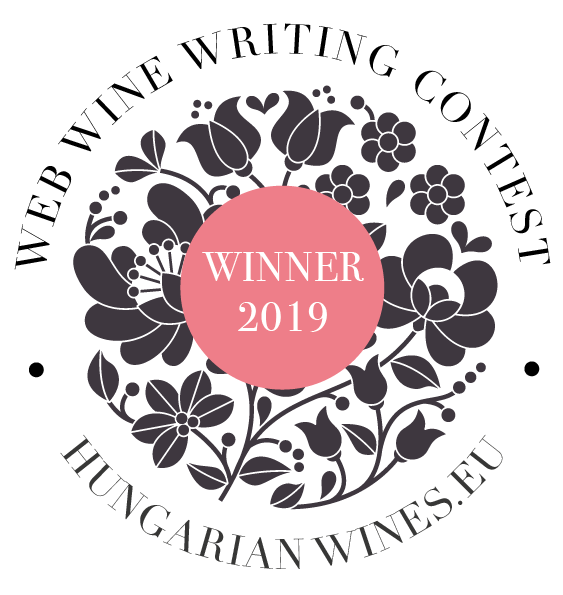For the first time, Indian sommeliers tested their skills at an international-level sommelier competition, The Best Sommelier of India 2025, by the all-new Sommelier Association of India. A behind-the-scenes look at how it unfolded and why it is significant for India
It was January of 2025. The lobby of The LaLit, a 5-star hotel in suburban Mumbai, was busy. Tourists were checking in. Businessmen sat, laptops before them, frowning at their screens. But the gaggle of young men in a corner, smartly turned out in suits, with lapels adorned with pins of various hues, were oblivious to the noise around them as they huddled together. In hushed tones, they were discussing ways in which to tackle an all-important hour ahead of them.
Maybe the most important hour of their lives.
The group of men (sadly, no women participated this year) were young sommeliers from various parts of the world – Singapore, Italy, Mauritius, New Zealand, and Dubai. What they had in common was the fact that they were Indian. The hour in question was for the semi-finals of the mint-new Best Sommelier of India competition, run by the Sommeliers Association of India (SAI) in association with the world body, Association de la Sommelerie International (ASI).
Testing for excellence
This was an event of major significance for Amrita Singh DipWSET and Mattia Antonio Cianca DipWSET, co-founders of SAI along with decorated sommelier Salvatore Castano. While they were busy setting the stage for the imminent Best Sommelier of India competition, they were aware that this edition would set the benchmark for SAI in India, affiliated as it was with ASI, the name behind the highly-coveted and profoundly difficult Best Sommelier of the World title.
SAI, at the time, had been in existence for a short 11 months since being unanimously voted in as a member of ASI’s College of Applicants. It had notched just over 100 members and was growing quickly. The founders had a slew of ambitious plans to grow the wine community in India. But the timing of the competition held its challenges. Would India, with its small but passionate sommelier community, be ready to enter the world stage? The Best Sommelier of Asia and the Pacific competition was slated for September 2025, leading up to the triannual Best Sommelier of the World, just over a year away. So, holding the Best Sommelier of India competition early in 2025 was important. If not, it would mean another four years until the next opportunity for SAI to enter a candidate from India. The question of assessing national standards in sommelerie had become an urgent one.
Plenty of passion, far less opportunity
It is no secret that while talent and passion abound in India’s small wine community, infrastructure, costs, and opportunities are often out of the reach of young sommeliers. This does not stop them, though. Many, with an eye on long-term, international achievements, push themselves hard, often taking jobs outside the country to upskill and earn better, doubling up a full-time job with intense study.
India’s wine story itself is not without challenges. High taxes, a federal system of excise, and a large populace of which only a small percentage are wine drinkers meant that India still qualifies as a developing wine country. It started producing wine only about 40 years ago, with a growing band of consumers eager to discover more about wine. A definitive move towards premiumization and quality wine consumption had begun to rise post-pandemic. Still, most hotels and restaurants were reluctant to hire sommeliers, given the relatively small proportion of wine-drinking guests. Moreover, the global dip in wine consumption seemed to have echoed in India over the last year, causing its hitherto steady growth to hit pause.
But the fact that working with wine is a passion, not merely a job, was reflected in the enthusiastic response the competition drew from the sommelier community. Fourteen Indian sommeliers, based all around the world, showed up to participate in the quarter-finals. Of them, five were India-based.
Competing at international standards
Mattia, who was handling the practicalities of the competition found himself surprisingly relaxed before the start. He had finalised every scheduled task for the competition ahead of time and created extra banks of questions. “This competition had to be treated not as a national-level competition, but an international-level one. The structure had to mirror that of the Best Sommelier of the World. As I worked on putting the segments together, I would ask myself, Is this question too easy? Is this acceptable?”
Salvatore Castano, crowned Best Sommelier of Europe and Africa in 2021, and Mattia himself were both veterans of several international competitions, having competed on the world stage previously. So, they knew the level the tasks needed to be pitched at. “My advice to the sommeliers is to manage their stress levels, this being their first time on a big stage,” said Mattia.
At the welcome dinner on the eve of the competition, the mood was one of excited anticipation mixed with nervous energy. What surprises would the next two days hold?
Came the morning of the quarter-finals, and the contestants arrived at The LaLit bright and early. Many of them had taken leave from work to fly to India, and there was a palpable sense of excited anticipation in the air. No one knew what to expect, only that there would be a blind-tasting component, a theory section, and a practical test for service.
Being the first competition of its kind to be held in India, there was little to benchmark against – but things became clear soon enough. “I knew that ASI standards were tough, but this was an eye-opener,” said Pankaj Singh, 29, assistant head sommelier at Dubai’s Arts Club. Many participants found themselves wrong-footed by the theory questions – 46 of them to be answered in an hour and requiring a substantial depth and breadth of wine knowledge.
“ASI tests you not just on wine but other beverages like tea, coffee, spirits, beer, sake – and we were not sufficiently prepared for that,” one of them told me. “Then came two wines we tasted blind, and had to provide full organoleptic profiles for, along with suggested food pairings.”
Savio Cardoza, 35, head sommelier at Atlantis, The Royal in Dubai, was not expecting an easy ride, having already attempted his Advanced Sommelier exam with the Court of Master Sommeliers twice earlier. “But as I worked in the industry, I was more confident about the theory and service segments.” Tasting was likely to be challenging, but he hoped to reach the semi-finals.
Pankaj Singh was equally nervous. In 2019, while watching Marc Almert win ASI’s Best Sommelier of the World, he had wondered why there wasn’t a single Indian participant on the stage. Now with the prospect of being in the Best Sommelier of India competition before him, it was both exciting yet intimidating. “I told myself that it was enough for me just to be present on stage this time!”
Amber Deshmukh, 35, business development manager with leading Indian importer Monika Alcobev, firmly believed that the key to success was knowledge. While chatting with me over Zoom, he pointed to his wine study soft board in his Mumbai flat, filled with neatly lined up post-its and colourful maps of every wine region imaginable. Therefore, theory, for him, was less of a concern than the service and blind-tasting components. “Being in wine retail, I have not worked on the floor for years now, while the other contestants are well-versed with service – I do not expect to reach the finals.”
Sommelier Jai Singh, working in Italy, had studied and worked abroad for several years. “But I awoke one morning with a sense of emptiness. I was so busy studying that I realized I had left my country, my people, behind.” This was going to be a golden opportunity for him to reconnect with his home country and the family he had left behind.
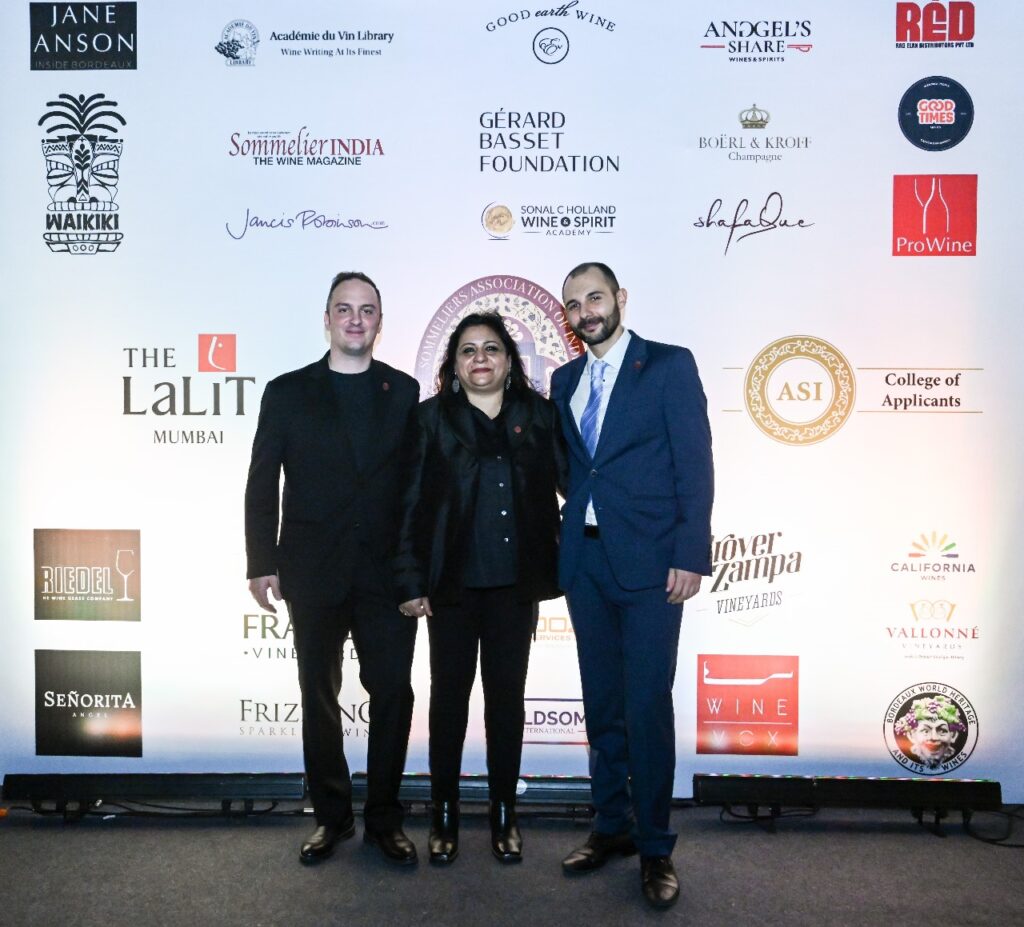
Shiva Chaurasiya, 24, had left home and family at age 22 to move to Singapore when he did not get the kind of work he sought in India. Now, working as junior sommelier at the upscale wine club 67 Pall Mall Singapore, he looked to assess where he stood, knowledge-wise, with his eye on mastering the CMS Advanced Sommelier exam in a year. “I was scared initially,” he confessed, “But I thought I should give it a shot, despite knowing ASI standards are likely to be very high. But I believe you never lose, you only learn.”
The road to the finals
While Pankaj Singh was excited at the prospect of participating, he was hoping for an easier run in the theory segment. But it was not to be so, with the added pressure of strict time restrictions. But, to his surprise, he made it through to the semis, coasting through service and the blind tasting.
Shiva learned a lot from the quarter-finals. “The judges expected a lot from a candidate – knowledge about many beverages besides wine – and importantly, how to be a good sommelier. You must be hungry to learn, always.” He knew that employers today looked for sommeliers who are able to multitask – handling tastings, making cocktails, tea, or coffee – and sharing that knowledge with the guests. He hoped to be up to the task. Pankaj Singh agreed, “You must be an all-rounder to make it through.”
Salvatore Castano, part of the conceptualizing team setting up the exam format, was impressed with the competence levels displayed by the participating Indian sommeliers in the quarter-finals. “They showed great promise, demonstrating passion, dedication, and a solid foundation of knowledge.”
And then there were five
The five semi-finalists were announced.
The announcement was made. Jai Singh, Shiva Chaurasiya, Savio Cardoza, Amber Deshmukh, and Pankaj Singh had made it to the semifinals. This would be held on the morning of the finals. The finals themselves were slated for the evening, to be held before a 200-strong live audience. Only three candidates would participate in the finals to showcase their skills to the judges and the audience on a stage set up on the sprawling lawns of The LaLit.
The suspense would continue until the three finalists were announced.
To his consternation, Jai Singh found the semi-final theory section tough – “Perhaps the toughest I have ever done – we had to answer 16 open response questions in 15 minutes. For instance, one was, In which years was Chateau d’Yquem not produced? Then came the blind tasting of two wines, the filling of a blank wine region map (the grand cru lieux-dits of Chablis), and the service of a sparkling wine to the judges within three minutes.” The blind-tasting segment came as a relief to him. “I felt I did well.”
Pankaj was more relaxed by now – “I had nothing to lose by this point. I enjoyed the tasting segment, and felt sure I would get through.” Amber revealed that while the theory section had helped bolster his confidence, “I did not expect to get to the finals. In a way, that settled any nervousness I might have felt.” He too, felt he had little to lose.
The semis finished at 12.30, and the five somms were asked to have lunch and assemble for the live announcement of the finalists on stage that evening.
That evening, standing under the spotlight before the judges, doubts assailed each of them afresh. Pankaj confessed he had lost hope… until he heard his name called at last. He joined Amber Deshmukh and Jai Singh on stage. The three had made it to the finals.
The finale – nothing to lose!
The finalists drew lots to settle the order of testing. Pankaj was the first one on stage. “I was nervous being called up first,” he confessed, “And unsure how many tasks there would be. My lack of confidence affected me, especially as the wind blew out the candle during decanting, and I forgot to announce the change of vintage of the wine during service. I could have done better.”
Jai Singh, who came next, also adopted a nothing-to-lose strategy, which helped bolster his confidence. “I had participated mainly to earn a place in the ASI Bootcamp (to provide the winning ASI sommeliers from around the world with a high quality, intensive three days of masterclasses, workshops, and tastings – Ed), which I had already done by earning a place in the finals. This helped give me confidence. As I walked towards the stage, I thought I must just do what I do every day. So, win or fail, nothing will change.”
For Amber, it was a chance to take learning to the next level. “The competition is about wines but goes far beyond it. The rest is about many other beverages – tea, coffee, water, spirits, sake, even cigars. So, while wine is very important, this competition tests you at many different levels.”
The three finalists went through their tasks – timed decanting of a red wine, identifying teas by their profiles, checking a wine list for errors, spelling, and factual, and a blind tasting of wines and spirits, followed by a food pairing section. This was followed by a slide presentation of images of famous wine personalities and top wine estates – they were required to identify each by name. Finally, all three were given a magnum each of sparkling wine that they were told to pour freehand into 15 glasses within a specific time limit – a tricky but vital task for any working sommelier. Despite a few inevitable slip-ups, they acquitted themselves well.
After a tense wait, the judges announced the winners.
To much fanfare and applause, Jai Singh was crowned the first-ever Best Sommelier of India. In second place came Pankaj Singh, Amber Deshmukh placed third.
In a burst of emotion, Jai Singh dropped to his knees in gratitude. In the audience, his siblings, who had travelled all the way from Lucknow to Mumbai to see him on stage, rose to their feet to join the thunderous applause. Later they told me, beaming, “We always knew he was different, special. He always wanted to walk his own path. We are so proud of him, and what he’s achieved.”
For Amrita Singh, the finale brought a sense of relief at a job well done and a vital step taken in aiding the development of India’s wine culture. The presence of senior ASI functionaries Saiko Tamura-Soga, ASI Vice-President for Asia & Pacific, and Nina Basset FIH, co-founding trustee, Gérard Basset Foundation, on the judging panel, along with other noteworthy judges was especially gratifying.
What the participants displayed in abundance over the two days of intense competition was great potential and promise, said Mattia. Agreed Salvatore, “Their strengths lay in their enthusiasm and eagerness to learn, which are crucial qualities in this profession.”
Emotions run free
Amber confessed to feeling a mix of both disappointment and happiness at his third place. “I was soon flooded with messages from my friends from India and around the world, and I realised that this was just the beginning, in a way. I must work hard now; I cannot let this go to my head or develop an attitude.”
For Pankaj, “the feeling was indescribable – it will stay with me forever.” When he had boarded his flight to India, he had mentally prepared for nothing more than a nostalgic trip home. Now, it had become something much more. “It is my dream to represent my country. Win or lose, it’s the learning that’s important.”
Shiva admitted feeling sad at not making it to the finals. “It would have been the first time for me on such a big stage, with international judges and personalities that you do not get to interact with every day. It also meant I missed the chance to attend the ASI Bootcamp – only the top three get to go and learn from the best sommeliers in the world.” But it was a fight worth fighting. “I will be back on the stage again – better and stronger.”
Amber points out that competing on an international stage immediately puts you at a different level. “I have learned so much. Today, I can make cocktails, understand spirits, and handle blind tastings. I would say failure has been my biggest teacher and the biggest motivator to do better than ever.”
Looking ahead – refine, improve, learn
Jai Singh will make history by being the first ever Indian sommelier at the ASI Best Sommelier of Asia & Pacific contest in Kuala Lumpur in September 2025 and the ASI Best Sommelier of the World competition in Lisbon, Portugal, in October 2026. “I believe that the environment and people around me played important roles in what I do, and their love and support in different phases of my life helped me to grow and inspire.”
Saiko Tamura-Soga, who had especially flown down to India for the competition, marvelled at the world-class standards set by the inaugural Best Sommelier of India competition. She was also impressed by the talent, dedication, and humility demonstrated by the Indian sommeliers who participated. “The founders of the fledgling organisation, SAI, demonstrated a sense of unity and energy under the able guidance of its co-founders, especially president Amrita Singh,” she said.
Salvatore had some words of advice for all the participants and for those hoping to participate next time. “Want to reach world standards? Refine your tasting techniques, improve service finesse, and gain broader exposure to global wine styles and cultures.”
Mattia himself admitted to being both surprised and happy at the showing of the sommeliers, many of whom were on a big stage for the first time. He, too, offered advice: “It is normal to forget details, normal not to be able to complete tasks on time – it happens even at the Best Sommelier of the World competition! Remember, what the champions do so well are the basics – because they practice to the point of perfection. So, when crunch time comes, there is no pressure whatsoever.” The key is the ability to turn theoretical knowledge into easy delivery, he adds. “Champions are able to switch their brains from study mode to competition mode very easily. That is where they pick up points. And points lead to victory.”
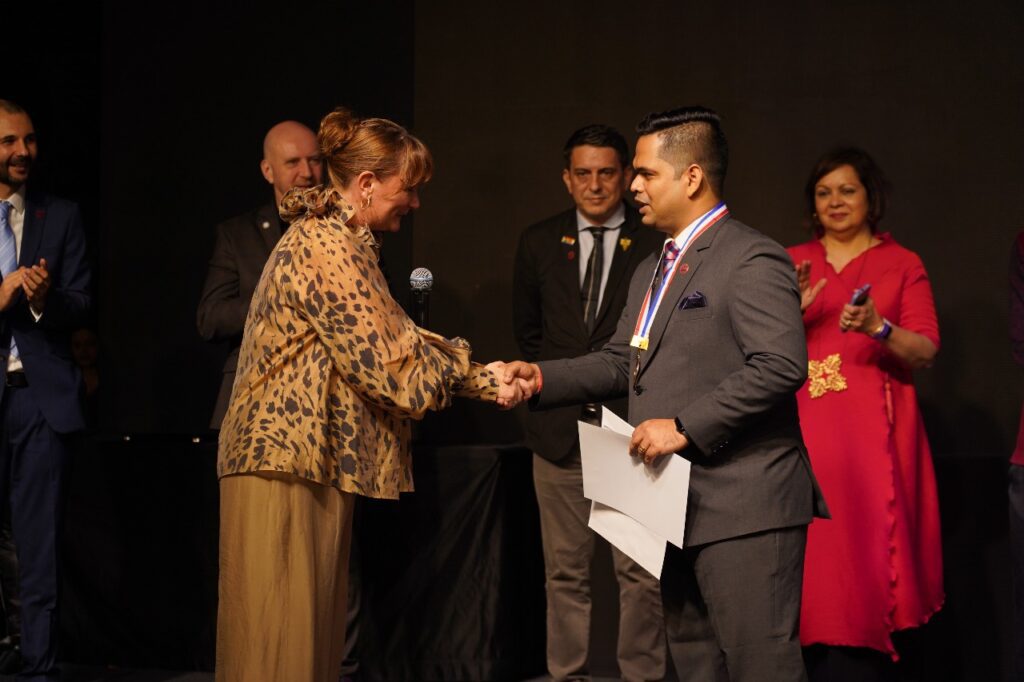
The Indian wine industry: more support needed
This competition was a significant milestone for India’s wine fraternity, felt Jai Singh, but much more was needed going forward. “We need to learn and grow together, make the community in India bigger, and better for the next generation.” This indicates the need for mentorship and support, pointed out Pankaj Singh, “I would like to help more somms from India make it to the world stage.” Savio Cardoza agreed. “It took me 10 years to get here… I know I can pass on my knowledge much sooner. Mentorship is the need of the hour.” Amber agreed, quick to acknowledge the role that mentors have played in his own life, from pioneers in the Indian wine industry to his CMS mentors. Support and networking are the keys to success, he concurred. That the competition brought immense growth opportunities to the participants was unanimously acknowledged by each participant.
Mattia pointed out that sommeliers can form a tightly-knit community, offering invaluable support to one another, especially in a country that was on the cusp of finding its identity in the wine world. “The chance to meet fellow sommeliers, hear their stories, and learn from them, can be invaluable. Friendships within the community are priceless too, and can lead to great networking opportunities.”
Salvatore agreed. “My advice to the sommelier community is to stay curious, keep tasting, and embrace continuous learning.”
Venue partner: The LaLit, Mumbai
The 14 quarter-finalists: Karan Patyal; Vaibhav Jawale; Akul Anand; Rohan Dole; Nigel Vaz;; Shiva Chaurasiya; Tarun Acharya; Pankaj Singh; Amber Deshmukh; Rajan Singh; Jai Singh; Atharva Joshi; Savio Cardoza; Abhishek Batabyal.
The Judges: Saiko Tamura Soga; Nina Basset FIH; Sonal Holland MW; Henri Chapon MS; Cyril Thevenet; Salvatore Castano
Special Guest Judges:
Rajiv Singhal; Ritu Singhal; Charles Donnadieu; Subhash Arora; Reva Singh; Ruma Singh.
